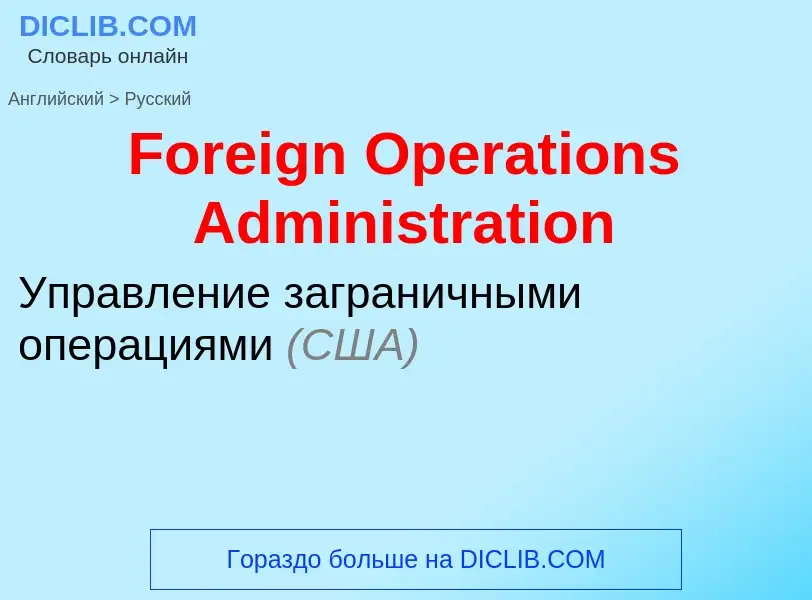Перевод и анализ слов искусственным интеллектом ChatGPT
На этой странице Вы можете получить подробный анализ слова или словосочетания, произведенный с помощью лучшей на сегодняшний день технологии искусственного интеллекта:
- как употребляется слово
- частота употребления
- используется оно чаще в устной или письменной речи
- варианты перевода слова
- примеры употребления (несколько фраз с переводом)
- этимология
Foreign Operations Administration - перевод на русский
[intrə'neiz(ə)l]
общая лексика
внутриносовой
анатомия
находящийся в носовой полости
медицина
интраназальный (внутриносовой)
прилагательное
анатомия
внутриносовой
находящийся в носовой полости
общая лексика
предмет посторонний
нефтегазовая промышленность
инородное тело (способное вызвать повреждение)
Определение
Википедия
The foreign policy of the Bill Clinton administration was of secondary concern to a president fixed on domestic policy. He relied chiefly on his two experienced Secretaries of State Warren Christopher (1993–1997) and Madeleine Albright (1997–2001), as well as Vice President Al Gore. The Cold War had ended and the Dissolution of the Soviet Union had taken place under his predecessor President George H. W. Bush, whom Clinton criticized for being too preoccupied with foreign affairs. The United States was the only remaining superpower, with a military strength far overshadowing the rest of the world. There were tensions with countries such as Iran and North Korea, but no visible threats. The CIA and FBI largely overlooked impending threats of massive terrorism by Al-Qaeda. Clinton's main priority was always domestic affairs, especially economics. Foreign-policy was chiefly of interest to him in terms of promoting American trade. His emergencies had to do with humanitarian crises which raised the issue of American or NATO or United Nations interventions to protect civilians, or armed humanitarian intervention, as the result of civil war, state collapse, or oppressive governments.
President George H. W. Bush had sent American troops on a humanitarian mission to Somalia in December 1992. 18 of them were killed and 80 wounded in a botched raid, ordered by the commanding general, in October 1993. Public opinion, and most elite opinion, swung heavily against foreign interventions that risked the lives of American soldiers when American national interests were not directly involved. That meant humanitarian missions were problematic. Clinton agreed, and sent ground troops only once, to Haiti, where none were hurt. He sent the Air Force to do massive bombing in the former Yugoslavia, but no American crewmen were lost. The major trouble spots during his two terms were in Africa (Somalia and Rwanda) and Eastern Europe (Bosnia, Herzegovina, and Kosovo in the former Yugoslavia). Clinton also tried to resolve long-running conflicts in Northern Ireland, and the Middle East, particularly the Israeli–Palestinian conflict. Key achievements during the second term included the 1995 peso recovery package in Mexico, NATO enlargement, the 1998 bombing of Iraq, the Dayton Accords that ended the killing in Bosnia, the NATO bombing campaign against Yugoslavia that stopped the ethnic cleansing in Kosovo, the Good Friday Agreement that brought peace in Northern Ireland, and the administration's policy of engagement with the People's Republic of China.

![[[Yitzhak Rabin]] and [[Yasser Arafat]] shake hands at the signing of the Oslo Accords on September 13, 1993. [[Yitzhak Rabin]] and [[Yasser Arafat]] shake hands at the signing of the Oslo Accords on September 13, 1993.](https://commons.wikimedia.org/wiki/Special:FilePath/Bill Clinton, Yitzhak Rabin, Yasser Arafat at the White House 1993-09-13.jpg?width=200)
![U.S. President Bill Clinton and Russian President [[Boris Yeltsin]] in the White House, October 1995. U.S. President Bill Clinton and Russian President [[Boris Yeltsin]] in the White House, October 1995.](https://commons.wikimedia.org/wiki/Special:FilePath/Boris Yeltsin with Bill Clinton-1.jpg?width=200)
![Vice Marshal [[Jo Myong-rok]] meets [[Bill Clinton]] at the White House, October 2000. Vice Marshal [[Jo Myong-rok]] meets [[Bill Clinton]] at the White House, October 2000.](https://commons.wikimedia.org/wiki/Special:FilePath/Cho Myong-nok and Bill Clinton.jpg?width=200)
![[[Jiang Zemin]] and Bill Clinton [[Jiang Zemin]] and Bill Clinton](https://commons.wikimedia.org/wiki/Special:FilePath/Clinton and jiang.jpg?width=200)
![Clinton shaking hands with [[Gerry Adams]] outside a business in West Belfast, November 30, 1995 Clinton shaking hands with [[Gerry Adams]] outside a business in West Belfast, November 30, 1995](https://commons.wikimedia.org/wiki/Special:FilePath/President Bill Clinton and Gerry Adams.jpg?width=200)
![President Clinton meeting with Bosnian President [[Alija Izetbegović]] in [[Tuzla]], 1997 President Clinton meeting with Bosnian President [[Alija Izetbegović]] in [[Tuzla]], 1997](https://commons.wikimedia.org/wiki/Special:FilePath/President Clinton meeting with Bosnian President Alija Izetbegovic in Tuzla, Bosnia - Flickr - The Central Intelligence Agency.jpg?width=200)
![Bill Clinton and Ambassador [[Harry Schwarz]], who negotiated lifting the remaining sanctions on South Africa Bill Clinton and Ambassador [[Harry Schwarz]], who negotiated lifting the remaining sanctions on South Africa](https://commons.wikimedia.org/wiki/Special:FilePath/SchwarzClinton.jpg?width=200)



